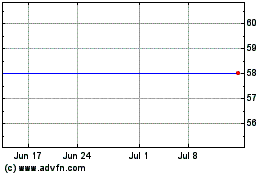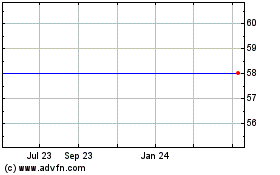Companies stampeded into the U.S. corporate-bond market Monday,
looking to raise at least $20 billion, prodded by persistently low
interest rates and heavy demand from investors who are eager to buy
debt from well-regarded borrowers.
At least 10 investment-grade borrowers floated deals in Monday's
market, led by a $4 billion deal from DirecTV Group Inc. (DTV), a
$3 billion covered-bond sale from Toronto-Dominion Bank (TD, TD.T),
and two-part deals from UnitedHealth Group Inc. (UNH), Philips
Electronics (PHG), and CenturyLink Inc. (CTL).
Including junk bonds from speculative-grade companies, at least
18 borrowers are in the corporate market. That is the most for any
single day so far this year, according to data provider Dealogic.
The record for the most bond sales in one day is 33, from Nov. 15,
2002, in records dating back to 1995.
Justin D'Ercole, head of Americas investment-grade syndicate at
Barclays Capital, said companies found an open window for issuance
wedged between events likely to support a bond rally, such as the
European Central Bank's three-year collateralized lending operation
last Wednesday, and events that might put an end to it, such as
this Friday's U.S. nonfarm payrolls report or looming supply from
Yankee banks.
"By early to mid-February, it was pretty clear we were in the
midst of a massive rally and, anytime you see that big a move, it
begets a fair amount of indecision," D'Ercole said. "But spreads
stabilized last week, and the supply-demand imbalance that's been
so supportive of improving spreads might be coming to end as Yankee
bank borrowing ramps up."
John Cokinos, head of leveraged-finance capital markets at Bank
of America Merrill Lynch, said companies are seeking to refinance
at low rates and for longer terms.
"We are seeing companies report their year-end results for 2011,
getting their earnings out and taking advantage of the market as
soon as they can," he said.
Companies are enticed by the lowest borrowing costs in decades,
while investors are buying because they believe there is still
value even at today's low rates.
The average yield on securities in Barclays's investment-grade
corporate-bond index was 3.27% on Friday; that was a record
low--the fifth record set in recent weeks--according to Barclays
data, which goes back almost four decades.
Part of that is attributable to unusually low yields on
Treasurys, to which investment-grade yields are benchmarked. Still,
the spread--or extra yield investors demand to buy riskier
corporate debt--closed just under 1.8 percentage points last week,
the lowest since Aug. 9, 2011.
"If you put aside the low yields, you still have attractive
valuations," said Anthony Valeri at LPL Financial, noting the
long-term average spread is half a percentage point lower, at 1.3
points. "When you look at fundamentals, they are as strong as they
have ever been."
In the junk-bond market, average yields fell below 7% last week
for the first time since early June 2011, according the Barclays
Capital U.S. high-yield index. The index finished the week with an
average yield of 7.02%, or 1.34 percentage points lower than
year-end 2011.
Total issuance for the day is roughly $21 billion, including
$15.45 billion of high-grade bonds.
The rapid start to March follows a heavy February when $98.58
billion of high-grade issuance was sold, breaking a record for the
month, according to Dealogic.
The prospect for March to post $100 billion is "very likely,"
according to Barclays's D'Ercole, who said investor appetite
enabled most borrowers on Monday to trim the offered yield by 0.05
to 0.10 percentage points.
Globally, high-yield issuance for 2012 totaled $73 billion as of
Friday, about $8 billion ahead of last year, according to
Dealogic.
Among the companies that have come to market:
DirecTV sold $4 billion in a three-part issue of five-, 10-, and
30-year debt at 1.55, 1.80, and 2.02 percentage points over
Treasurys, respectively;
TD Bank sold $3 billion of five-year covered bonds at 1.571%, or
0.706 percentage point over Treasurys. The triple-A rated bonds are
guaranteed 100% by prime Canadian residential mortgages insured by
the Canada Mortgage and Housing Corp.
Electronics maker Philips sold $1 billion of 10-year notes at
1.8 percentage points over Treasurys and $500 million of 30-year
bonds at two percentage points over Treasurys.
UnitedHealth is offering $600 million of 10-year notes at 0.95
percentage point over Treasurys and $400 million of 30-year bonds
at 1.25 points over Treasurys.
CenturyLink's deal includes $1.4 billion of 10-year notes at a
spread of 3.870 percentage points and $650 million of 30-year bonds
at 4.50 points.
Commonwealth Bank of Australia (CBA.AU) sold $2 billion of
three-year senior unsecured notes to yield 1.963%, or 1.55
percentage points over Treasurys, and $2 billion of privately
placed five-year covered bonds at 2.265%, 1.406 points over
Treasurys.
In the largest junk-bond deal Monday, casino operator Wynn
Resorts Ltd. (WYNN) sold $900 million of first mortgage notes for
repayment of bank debt and general corporate use. The 10-year notes
offered 5.375%.
-By Patrick McGee, Dow Jones Newswires; 212-416-2382;
patrick.mcgee@dowjones.com
DTE Energy (NYSE:DTV)
Historical Stock Chart
From Jun 2024 to Jul 2024

DTE Energy (NYSE:DTV)
Historical Stock Chart
From Jul 2023 to Jul 2024
